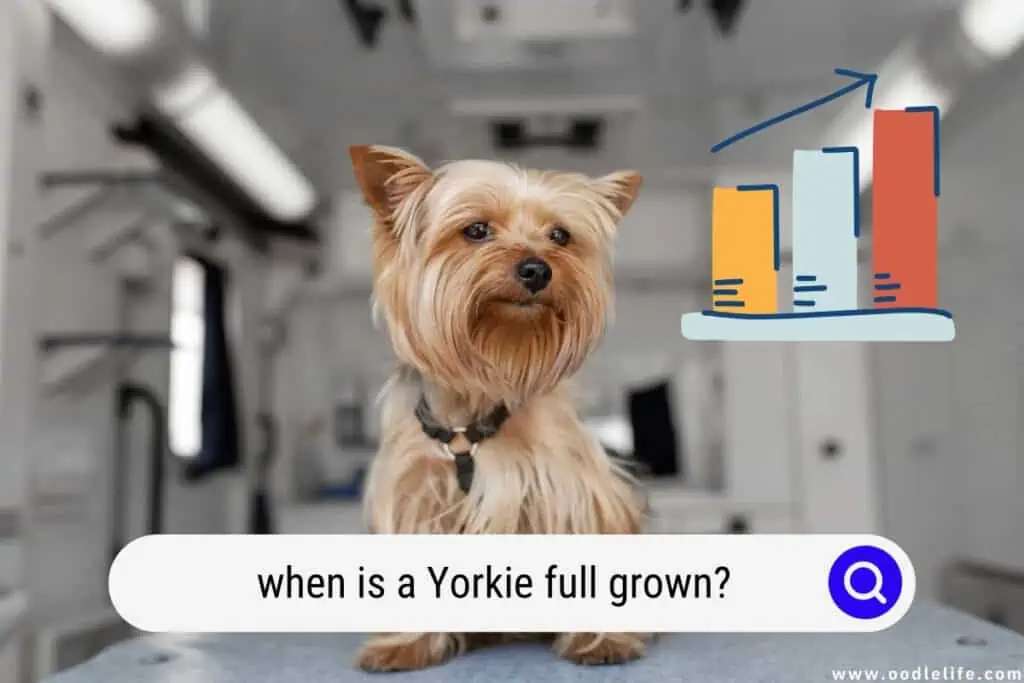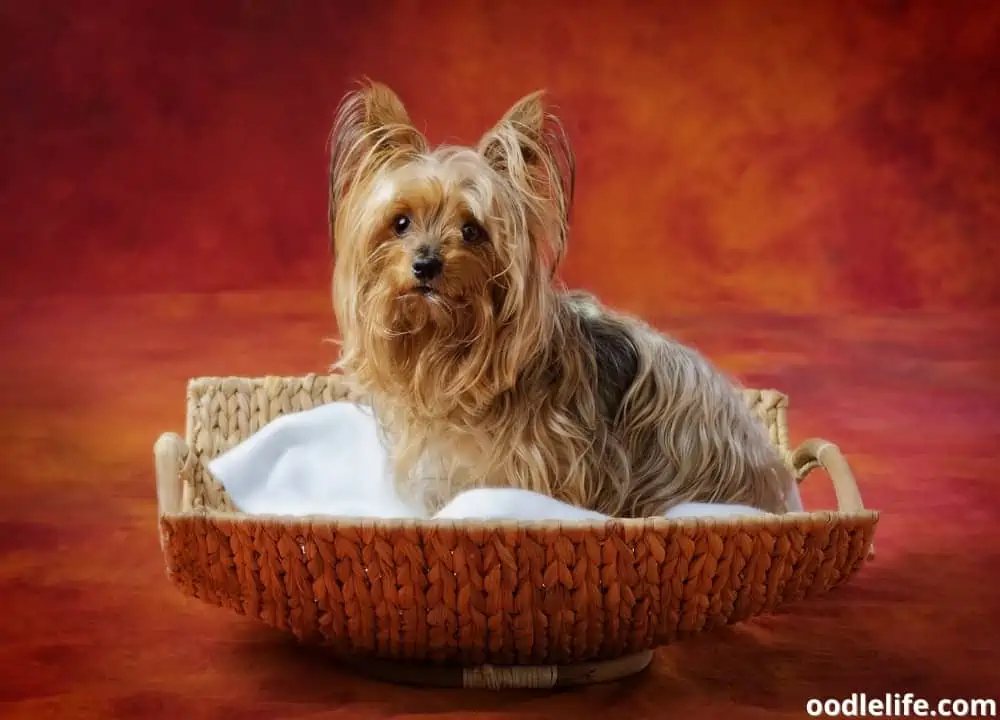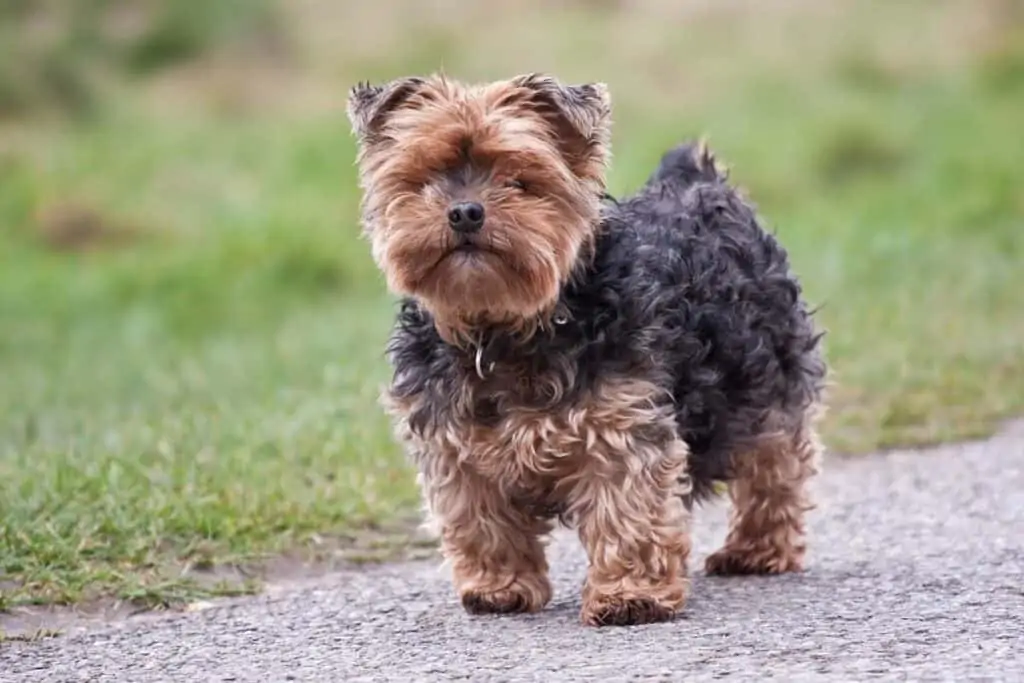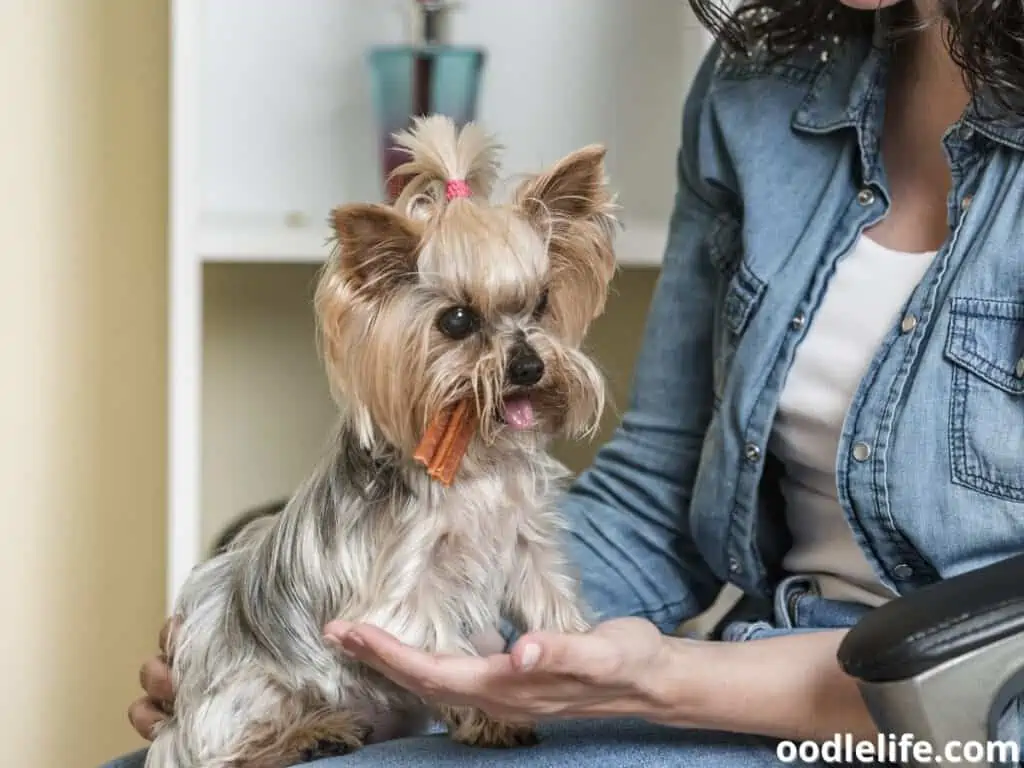When Is a Yorkie Full Grown? (with Photos)
Are you considering bringing home a Yorkie puppy? If so, you probably have a lot of questions. If this is your first dog, you may not know what growth milestones to expect.
When is a Yorkie full grown? When does it stop teething? When does it stop exhibiting “puppy” behaviors and settle into maturity?

Because they are a small breed, Yorkies grow faster than many other types of dogs. Yorkies usually reach maturity by about one year of age and may slow or even finish their physical growth by nine or ten months.
In this article, we’ll look at the Yorkie puppy from birth through their first year of life. We’ll attempt to answer the question “when is a Yorkie full grown?” and give some insight into the developmental stages of the Yorkie.
The Yorkie Breed
Yorkies, or Yorkshire Terriers, are toy-sized dogs of the Terrier breed. Scottish farmers originally bred them to catch rats in mines, mills, and barns, and their Terrier energy makes them great companions, full of personality and spunk.
The Yorkie is one of the smallest subgroups of the Terrier breed and one of the smallest dogs in the world. A Yorkie is usually no more than seven pounds fully grown.
Yorkies are also known for their lustrous, floor-length coats. Surprisingly, Yorkies are hypoallergenic, as their hair is more like human hair than fur. Most Yorkies have black and tan coats, but their coats can also be blonde and steel-blue.
Their silky coats are so distinctive that they make Yorkies a beloved show dog and household pet in cities globally.

The Yorkie Developmental Stages
Because the Yorkie is so small, it grows more quickly than other breeds of dog. Smaller dog breeds usually finish their physical growth when they reach ten months, while large dog breeds can continue growing for up to two years.
Large dogs grow slowly because large bones, joints, and ligaments need more time to set. Smaller dogs also usually live longer than large dogs because large dogs put more strain on their physiological processes and wear their bodies out more quickly, simply by being large.
However, physical growth is not the only part of the developmental process. All dogs, large and small, experience a “mellowing” of their frenetic puppy energy as they mature into well-mannered adult dogs. Some people consider the answer to the question “when is a Yorkie full grown?” to be “when it matures into adult behavior.”
Stage One: Neonatal Period
The neonatal period happens between weeks zero and two of the puppy’s life. At this time, the Yorkie puppy has no sense other than taste and touch. It is completely dependent on its mother for nutrition.
During this time, all the puppy can do is eat and sleep.
Yorkie puppies usually weigh around 2.5 to 5 ounces at birth. During the first two weeks, the puppy grows extremely fast. It’s common for a newborn Yorkie puppy to double its size every day!

Stage Two: Transitional Period
The transitional period is the time between weeks two and four of the Yorkie’s life. At this time, the puppy starts to develop other senses. Its eyes open, and it begins to move around and interact with its mother and littermates.
You may start to get a glimpse of its personality.
The Yorkie puppy will weigh between six and ten ounces at this time. It will still be growing incredibly fast, possibly still doubling its weight every day.

Stage Three: Socialization Period
The socialization period is a critical stage of the Yorkie puppy’s development. The stage occurs between weeks three and twelve of the puppy’s life.
During this time, the puppy becomes aware of its surroundings and can start to form relationships with humans. Changes in temperament and behavior happen rapidly during this time.
Puppies will wean during this period, and most go home to their new families between eight and ten weeks old. The puppy must be introduced to the world carefully and thoughtfully during this period. Young puppies need to discover the world without fear.
At this time, the Yorkie will weigh between 12 and 34 ounces. By 12 weeks, the puppy should weigh about one pound. Around week eight is a great time to weigh your puppy, because you can estimate its adult weight based on its weight at this time.
Take the puppy’s weight at eight weeks and multiply it by three to estimate the adult weight. The Yorkie puppy will start to exhibit its characteristic feisty energy. Now is a great time to start basic training and housebreaking.

Stage Four: Testing Period
The testing period refers to the time between months three and six of the Yorkie puppy’s life. At this time, the Yorkie is still considered a “young puppy,” and will begin “testing” boundaries and limits with its new owner, other animals, and the world in general.
The most important thing to do during this period is to keep your Yorkie puppy safe and teach it proper manners. If you have older dogs in the house, they will often do a great job of teaching your puppy manners.
Your Yorkie puppy will continue to grow, but the growth rate will slow. The Yorkie will no longer double its size every day. By the time it is about six months old, it will weigh between one and a half to three pounds.

Stage Five: Adolescence
The Yorkie puppy enters adolescence when it’s around six months old, and adolescence lasts until the puppy is about one year old. A teenager puppy can be difficult for Yorkie puppy owners, as the puppy will be full of energy and can be somewhat difficult to control.
The Yorkie puppy weighs anywhere between three to five pounds at this time. By the time adolescence ends, the puppy should have reached its adult weight. This weight is usually around seven pounds but could be as little as three pounds for some female dogs.

Stage Six: Young Adult
Although it has reached its adult weight, a Yorkie puppy is not considered a full adult until around age four. The puppy may still exhibit some puppy behaviors from time to time and is still full of its characteristic energy.
At age four, the dog is considered an adult. At this time, you may start to notice that the dog “slows down” a little. When your puppy reaches adulthood is when you may start to have some of the most rewarding experiences with your Yorkie.

How To Care for a Growing Yorkie Puppy?
While your puppy is in the process of becoming a full-grown Yorkie, you must ensure that you provide adequate care, food, and exercise.
Not providing your puppy with sufficient calories or nutrition can lead to growth problems. Similarly, over-exercising your puppy can lead to joint issues down the road.
Nutrition
Nutrition is one of the most important needs of a young puppy. Make sure that you buy only high-quality food that meets or exceeds AAFCO standards. Look for food that is specifically developed for small breed dogs, and for the correct life stage of your puppy.
Good quality dog food is all your puppy needs to grow properly. You should limit treats for training purposes only. Refrain from giving your puppy lots of fatty foods or foods high in carbohydrates.

Exercise
Exercise is critical for healthy puppy growth (and for your sanity!). Puppies have a lot of energy! They need to expel it somehow.
However, you must be careful when exercising young puppies who have not finished growing.
Over-exercising puppies can lead to joint problems in their later lives. While less common among small dogs, however, it is still a concern.
Most vets recommend that you do not start running or doing long walks or bike rides with your dog until it has finished growing. For Yorkies, this is when they are around one year old.

Conclusion
A Yorkie is fully grown at around one year of age. A full-grown Yorkie weighs between three and seven pounds. Until they are fully grown, Yorkie puppies will grow quickly, sometimes doubling their size every day.
Follow your vet’s exercise and nutrition advice while your puppy is growing. Proper exercise, nutrition, and socialization are crucial components of healthy puppy development.
Ensure that you socialize your puppy thoughtfully and carefully and pay attention to developmental growth stages. If you do this, your Yorkie’s big, fun personality will bring you joy for many years.